Integrative Negotiation: Process, Factors, and Achieving Win-Win
VerifiedAdded on 2023/06/09
|19
|1698
|454
Report
AI Summary
This report offers a comprehensive overview of integrative negotiation, a strategy designed to achieve win-win outcomes in conflict resolution. It details the strategic process, beginning with conflict identification and elaboration, progressing through the identification of needs and interests, the generation of alternative solutions, and culminating in the selection of the optimal solution. The report emphasizes the importance of understanding each party's perspective to foster mutual agreement. Furthermore, it outlines seven critical factors that facilitate successful integrative negotiation, including trust, common objectives, commitment, effective communication, understanding the process, respect for opinions, and faith in the other party's ability to contribute. The report references several scholarly articles to support the concepts discussed, providing a well-rounded analysis of integrative negotiation techniques and their practical application in various scenarios.

Integrative Negotiation
Paraphrase This Document
Need a fresh take? Get an instant paraphrase of this document with our AI Paraphraser
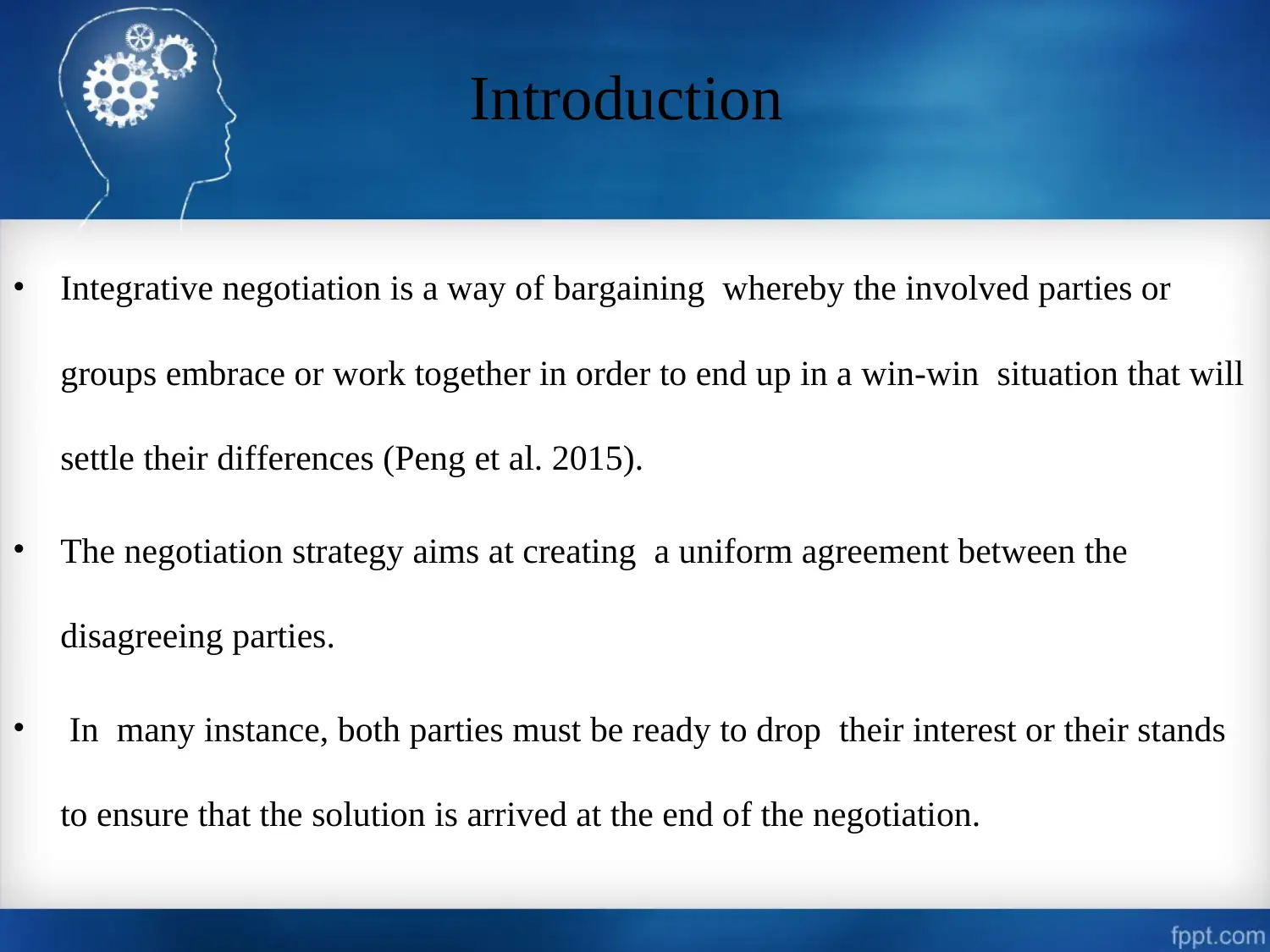
Introduction
• Integrative negotiation is a way of bargaining whereby the involved parties or
groups embrace or work together in order to end up in a win-win situation that will
settle their differences (Peng et al. 2015).
• The negotiation strategy aims at creating a uniform agreement between the
disagreeing parties.
• In many instance, both parties must be ready to drop their interest or their stands
to ensure that the solution is arrived at the end of the negotiation.
• Integrative negotiation is a way of bargaining whereby the involved parties or
groups embrace or work together in order to end up in a win-win situation that will
settle their differences (Peng et al. 2015).
• The negotiation strategy aims at creating a uniform agreement between the
disagreeing parties.
• In many instance, both parties must be ready to drop their interest or their stands
to ensure that the solution is arrived at the end of the negotiation.
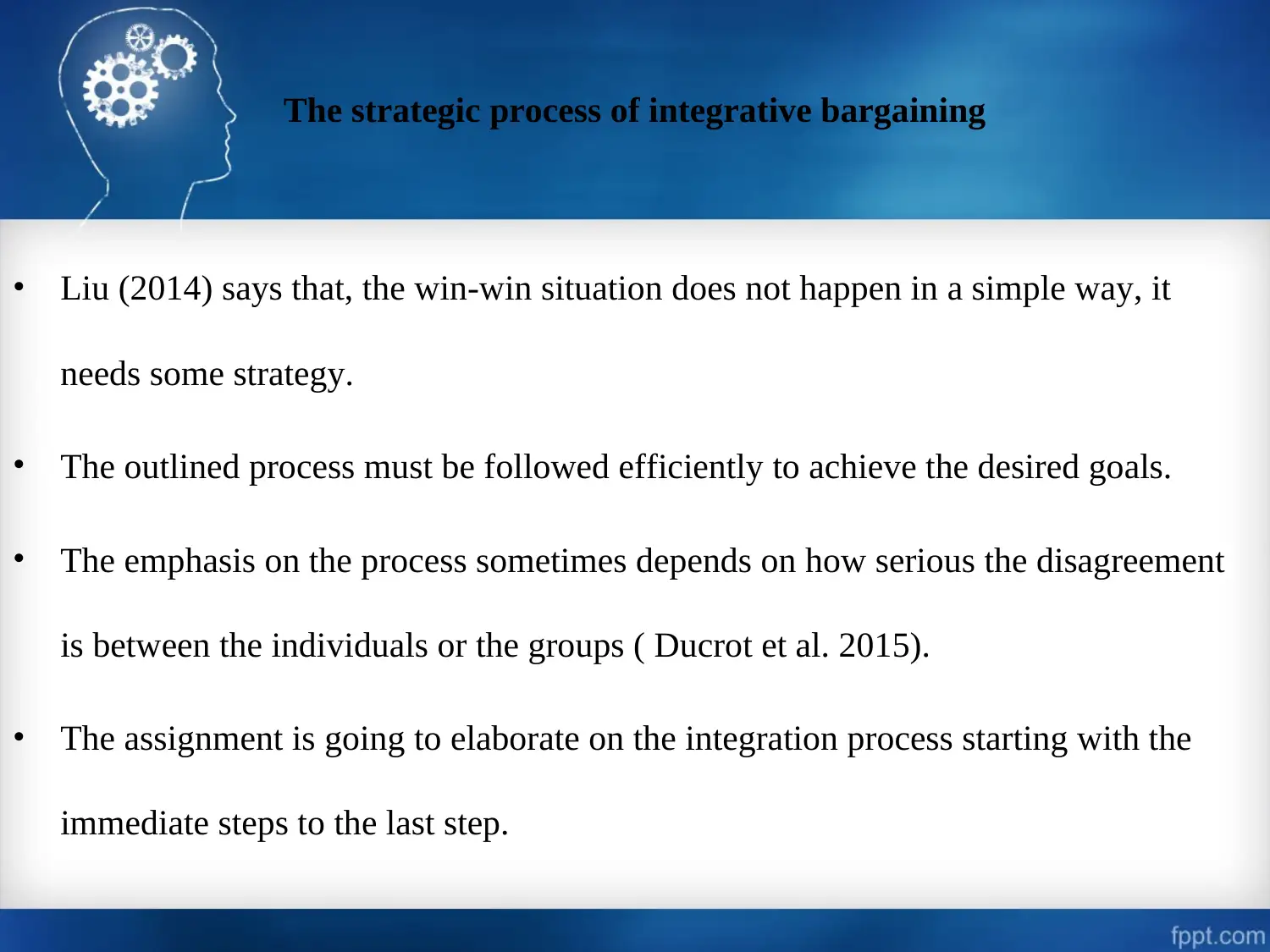
The strategic process of integrative bargaining
• Liu (2014) says that, the win-win situation does not happen in a simple way, it
needs some strategy.
• The outlined process must be followed efficiently to achieve the desired goals.
• The emphasis on the process sometimes depends on how serious the disagreement
is between the individuals or the groups ( Ducrot et al. 2015).
• The assignment is going to elaborate on the integration process starting with the
immediate steps to the last step.
• Liu (2014) says that, the win-win situation does not happen in a simple way, it
needs some strategy.
• The outlined process must be followed efficiently to achieve the desired goals.
• The emphasis on the process sometimes depends on how serious the disagreement
is between the individuals or the groups ( Ducrot et al. 2015).
• The assignment is going to elaborate on the integration process starting with the
immediate steps to the last step.
⊘ This is a preview!⊘
Do you want full access?
Subscribe today to unlock all pages.

Trusted by 1+ million students worldwide
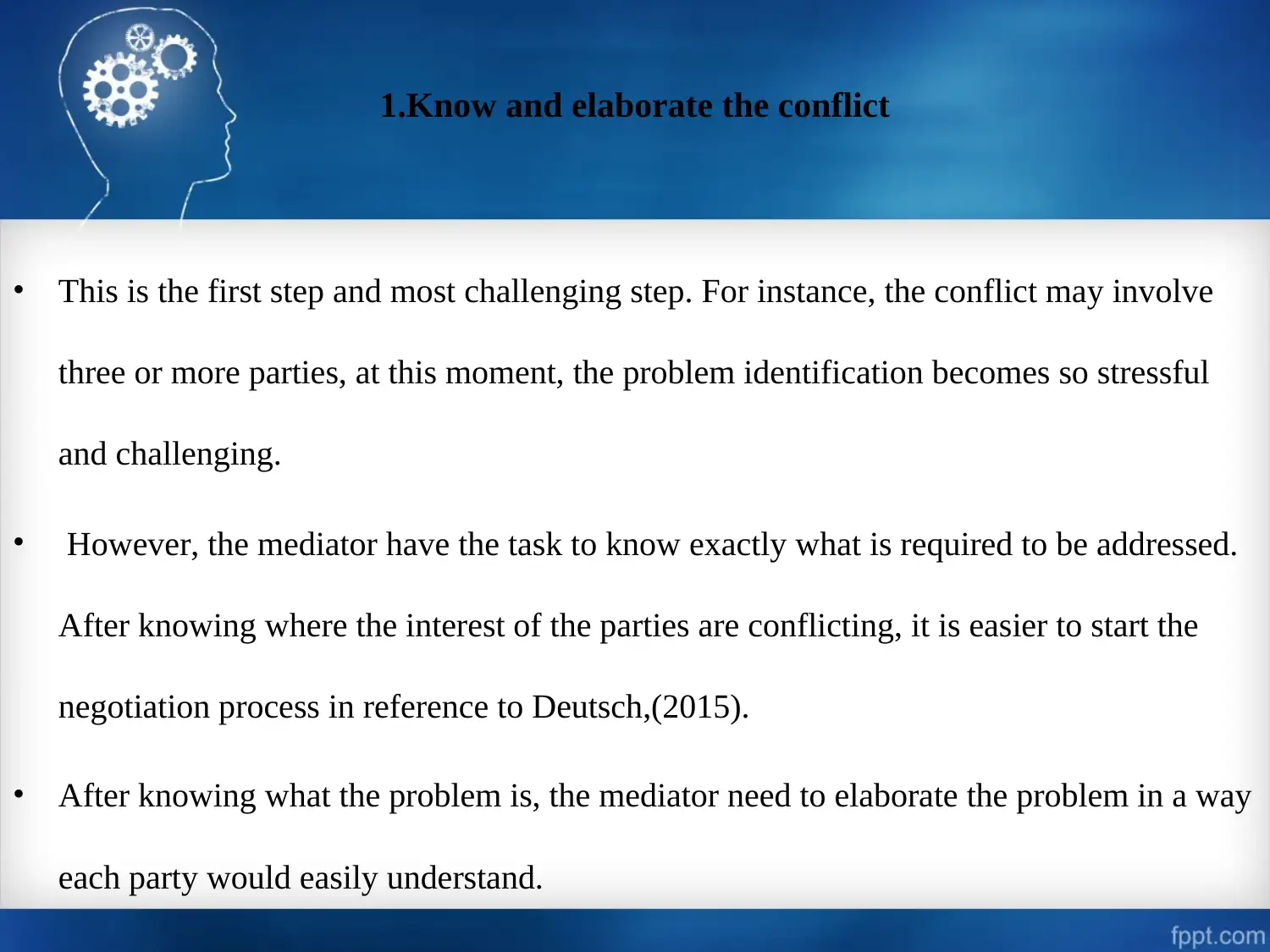
1.Know and elaborate the conflict
• This is the first step and most challenging step. For instance, the conflict may involve
three or more parties, at this moment, the problem identification becomes so stressful
and challenging.
• However, the mediator have the task to know exactly what is required to be addressed.
After knowing where the interest of the parties are conflicting, it is easier to start the
negotiation process in reference to Deutsch,(2015).
• After knowing what the problem is, the mediator need to elaborate the problem in a way
each party would easily understand.
• This is the first step and most challenging step. For instance, the conflict may involve
three or more parties, at this moment, the problem identification becomes so stressful
and challenging.
• However, the mediator have the task to know exactly what is required to be addressed.
After knowing where the interest of the parties are conflicting, it is easier to start the
negotiation process in reference to Deutsch,(2015).
• After knowing what the problem is, the mediator need to elaborate the problem in a way
each party would easily understand.
Paraphrase This Document
Need a fresh take? Get an instant paraphrase of this document with our AI Paraphraser
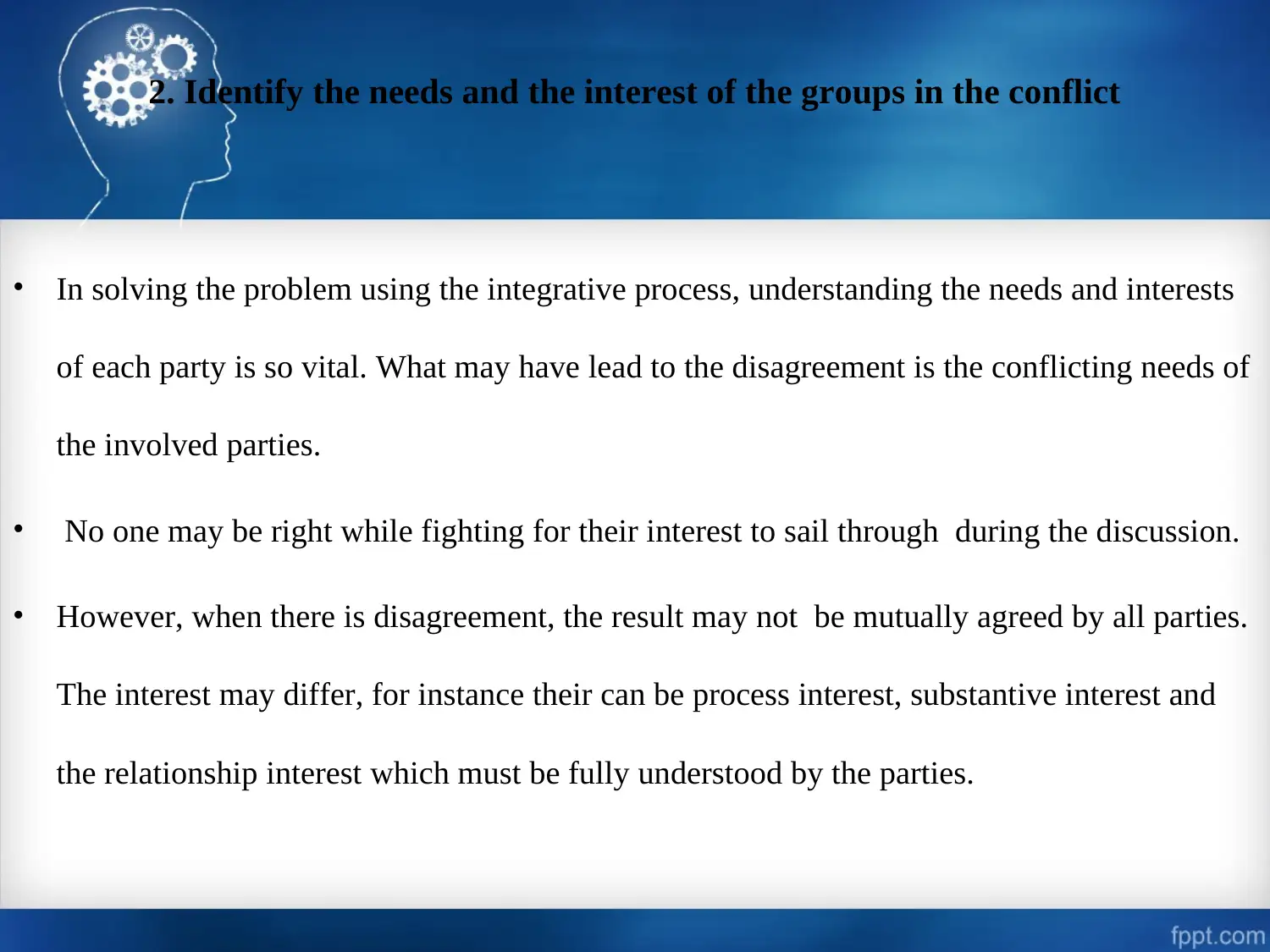
2. Identify the needs and the interest of the groups in the conflict
• In solving the problem using the integrative process, understanding the needs and interests
of each party is so vital. What may have lead to the disagreement is the conflicting needs of
the involved parties.
• No one may be right while fighting for their interest to sail through during the discussion.
• However, when there is disagreement, the result may not be mutually agreed by all parties.
The interest may differ, for instance their can be process interest, substantive interest and
the relationship interest which must be fully understood by the parties.
• In solving the problem using the integrative process, understanding the needs and interests
of each party is so vital. What may have lead to the disagreement is the conflicting needs of
the involved parties.
• No one may be right while fighting for their interest to sail through during the discussion.
• However, when there is disagreement, the result may not be mutually agreed by all parties.
The interest may differ, for instance their can be process interest, substantive interest and
the relationship interest which must be fully understood by the parties.
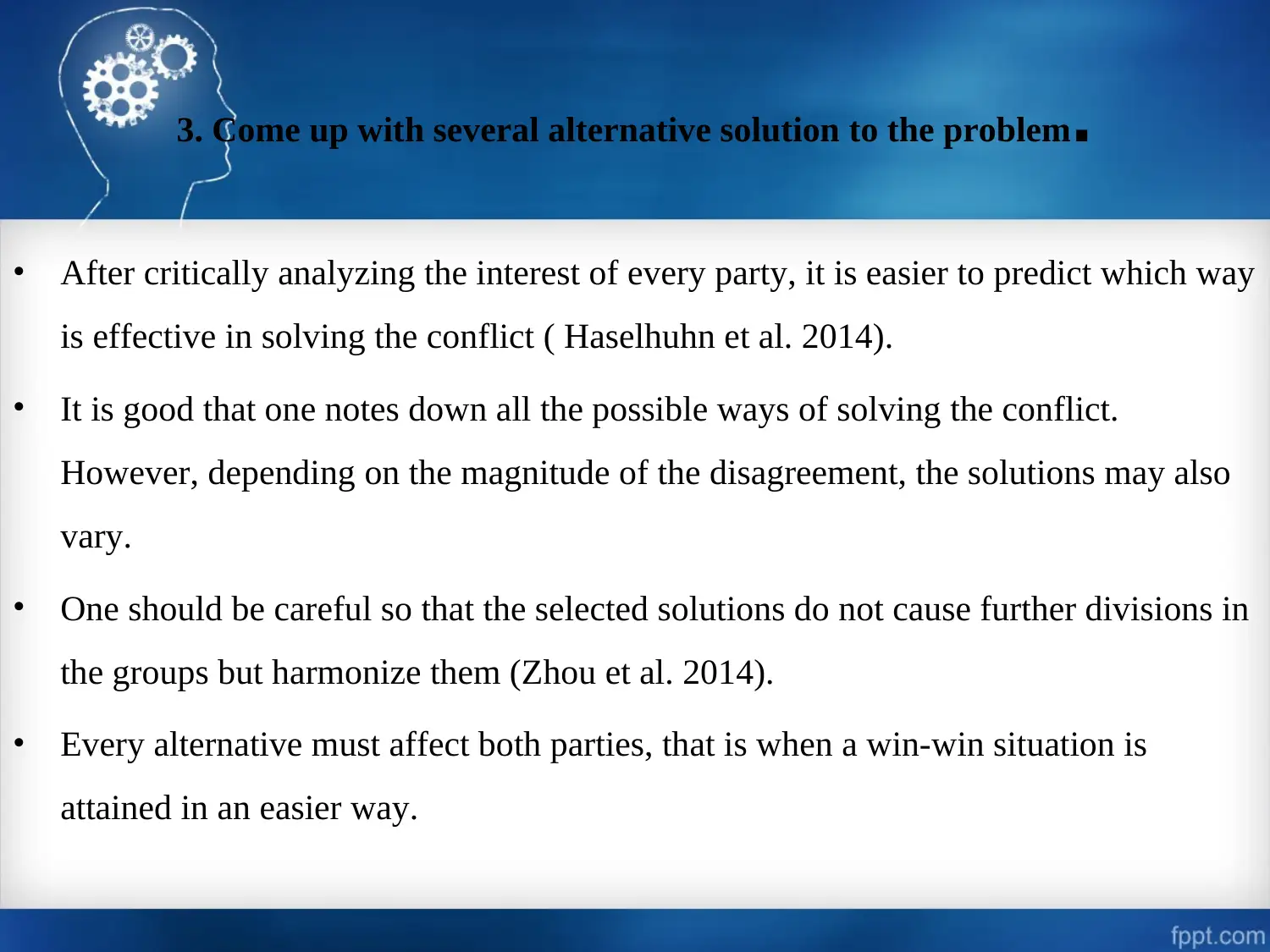
3. Come up with several alternative solution to the problem.
• After critically analyzing the interest of every party, it is easier to predict which way
is effective in solving the conflict ( Haselhuhn et al. 2014).
• It is good that one notes down all the possible ways of solving the conflict.
However, depending on the magnitude of the disagreement, the solutions may also
vary.
• One should be careful so that the selected solutions do not cause further divisions in
the groups but harmonize them (Zhou et al. 2014).
• Every alternative must affect both parties, that is when a win-win situation is
attained in an easier way.
• After critically analyzing the interest of every party, it is easier to predict which way
is effective in solving the conflict ( Haselhuhn et al. 2014).
• It is good that one notes down all the possible ways of solving the conflict.
However, depending on the magnitude of the disagreement, the solutions may also
vary.
• One should be careful so that the selected solutions do not cause further divisions in
the groups but harmonize them (Zhou et al. 2014).
• Every alternative must affect both parties, that is when a win-win situation is
attained in an easier way.
⊘ This is a preview!⊘
Do you want full access?
Subscribe today to unlock all pages.

Trusted by 1+ million students worldwide
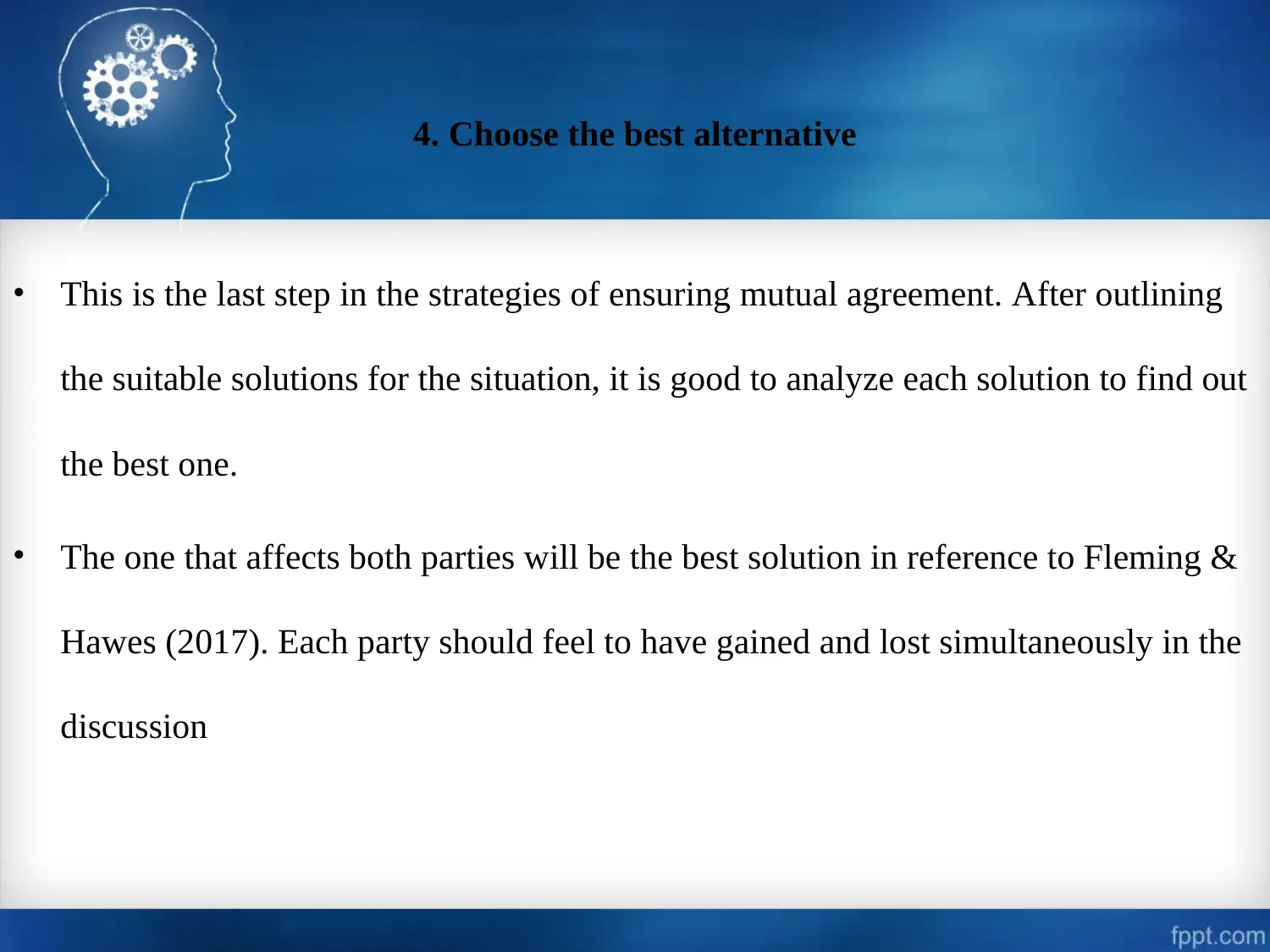
4. Choose the best alternative
• This is the last step in the strategies of ensuring mutual agreement. After outlining
the suitable solutions for the situation, it is good to analyze each solution to find out
the best one.
• The one that affects both parties will be the best solution in reference to Fleming &
Hawes (2017). Each party should feel to have gained and lost simultaneously in the
discussion
• This is the last step in the strategies of ensuring mutual agreement. After outlining
the suitable solutions for the situation, it is good to analyze each solution to find out
the best one.
• The one that affects both parties will be the best solution in reference to Fleming &
Hawes (2017). Each party should feel to have gained and lost simultaneously in the
discussion
Paraphrase This Document
Need a fresh take? Get an instant paraphrase of this document with our AI Paraphraser
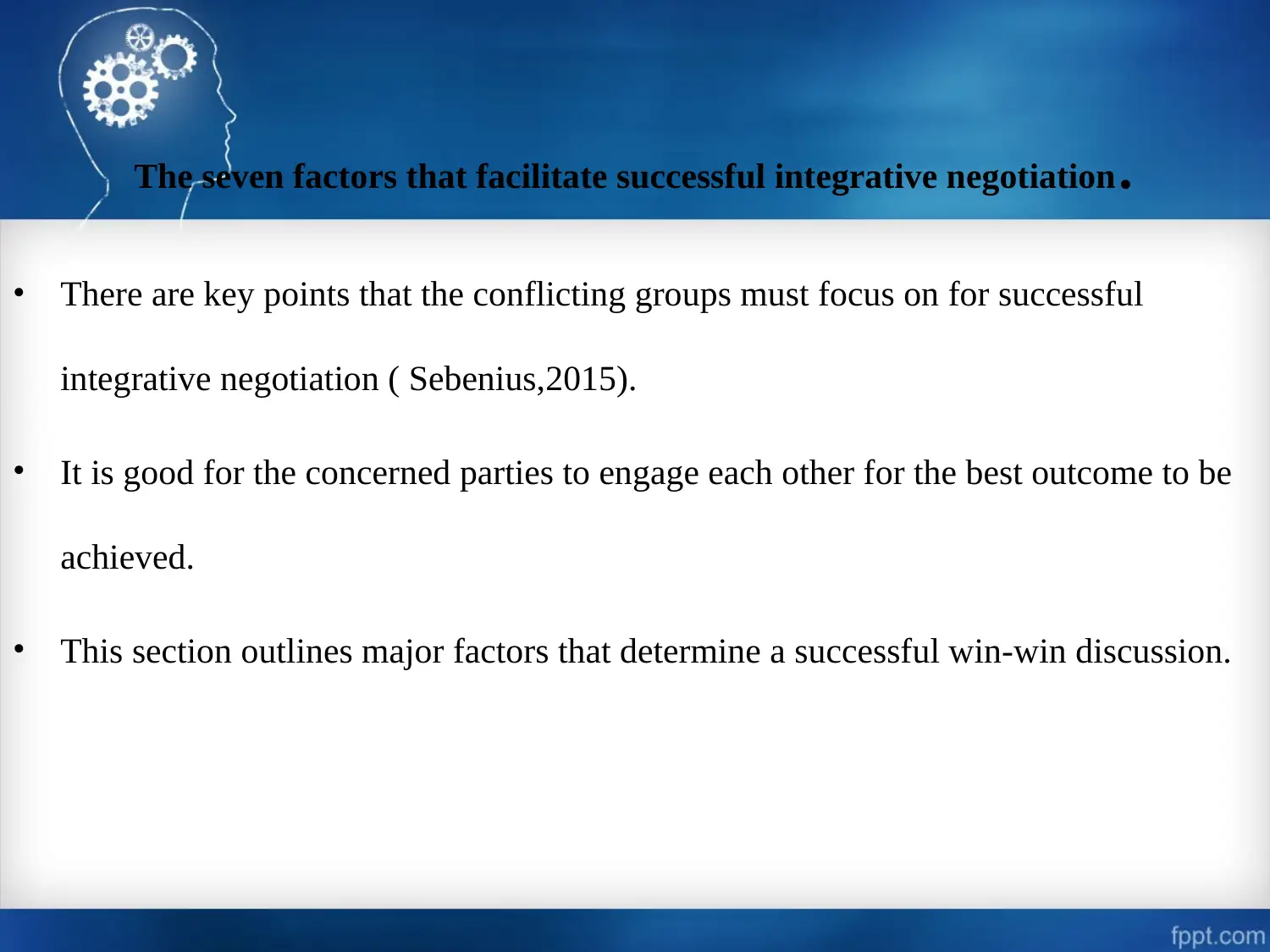
The seven factors that facilitate successful integrative negotiation.
• There are key points that the conflicting groups must focus on for successful
integrative negotiation ( Sebenius,2015).
• It is good for the concerned parties to engage each other for the best outcome to be
achieved.
• This section outlines major factors that determine a successful win-win discussion.
• There are key points that the conflicting groups must focus on for successful
integrative negotiation ( Sebenius,2015).
• It is good for the concerned parties to engage each other for the best outcome to be
achieved.
• This section outlines major factors that determine a successful win-win discussion.
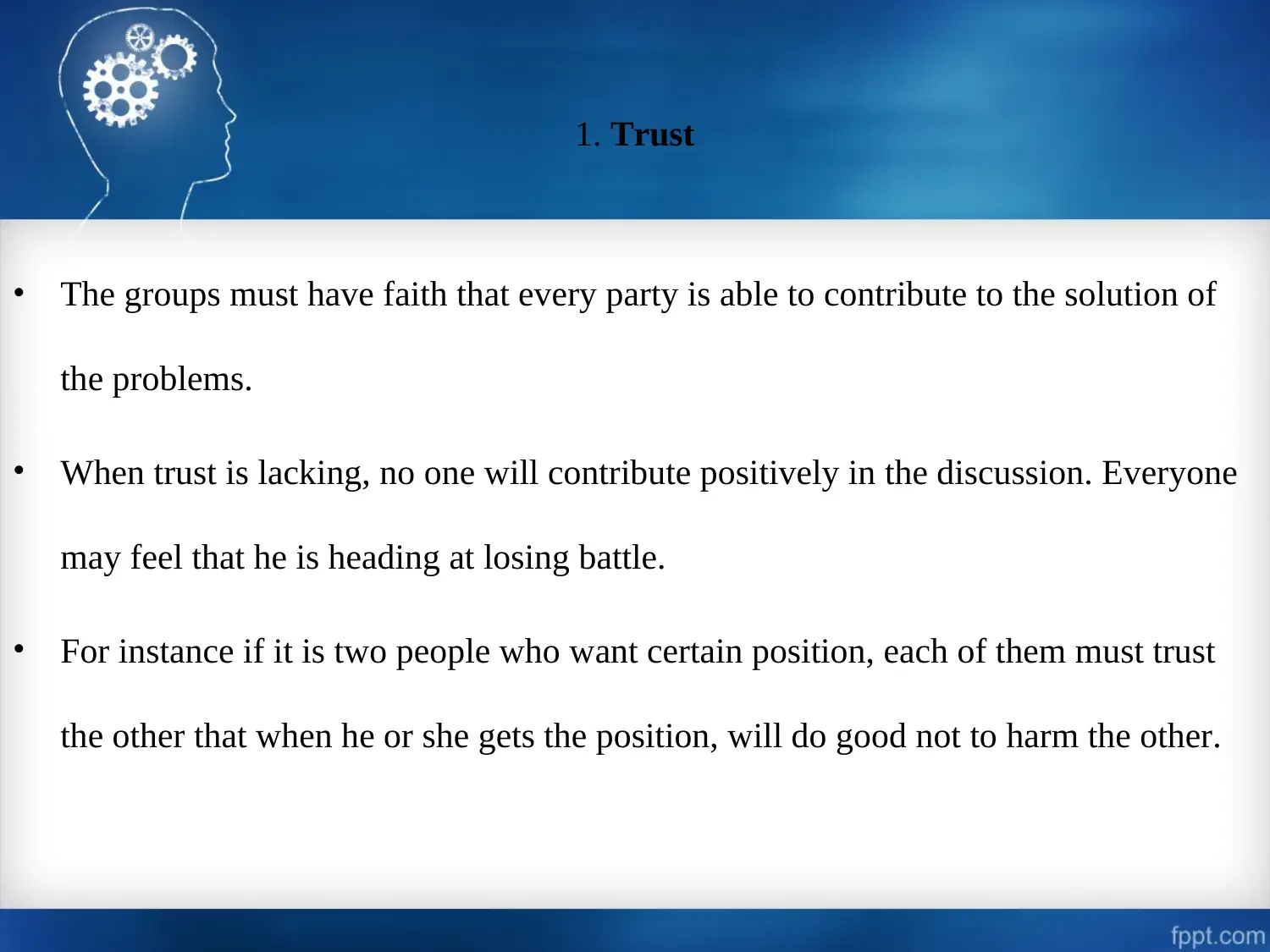
1. Trust
• The groups must have faith that every party is able to contribute to the solution of
the problems.
• When trust is lacking, no one will contribute positively in the discussion. Everyone
may feel that he is heading at losing battle.
• For instance if it is two people who want certain position, each of them must trust
the other that when he or she gets the position, will do good not to harm the other.
• The groups must have faith that every party is able to contribute to the solution of
the problems.
• When trust is lacking, no one will contribute positively in the discussion. Everyone
may feel that he is heading at losing battle.
• For instance if it is two people who want certain position, each of them must trust
the other that when he or she gets the position, will do good not to harm the other.
⊘ This is a preview!⊘
Do you want full access?
Subscribe today to unlock all pages.

Trusted by 1+ million students worldwide
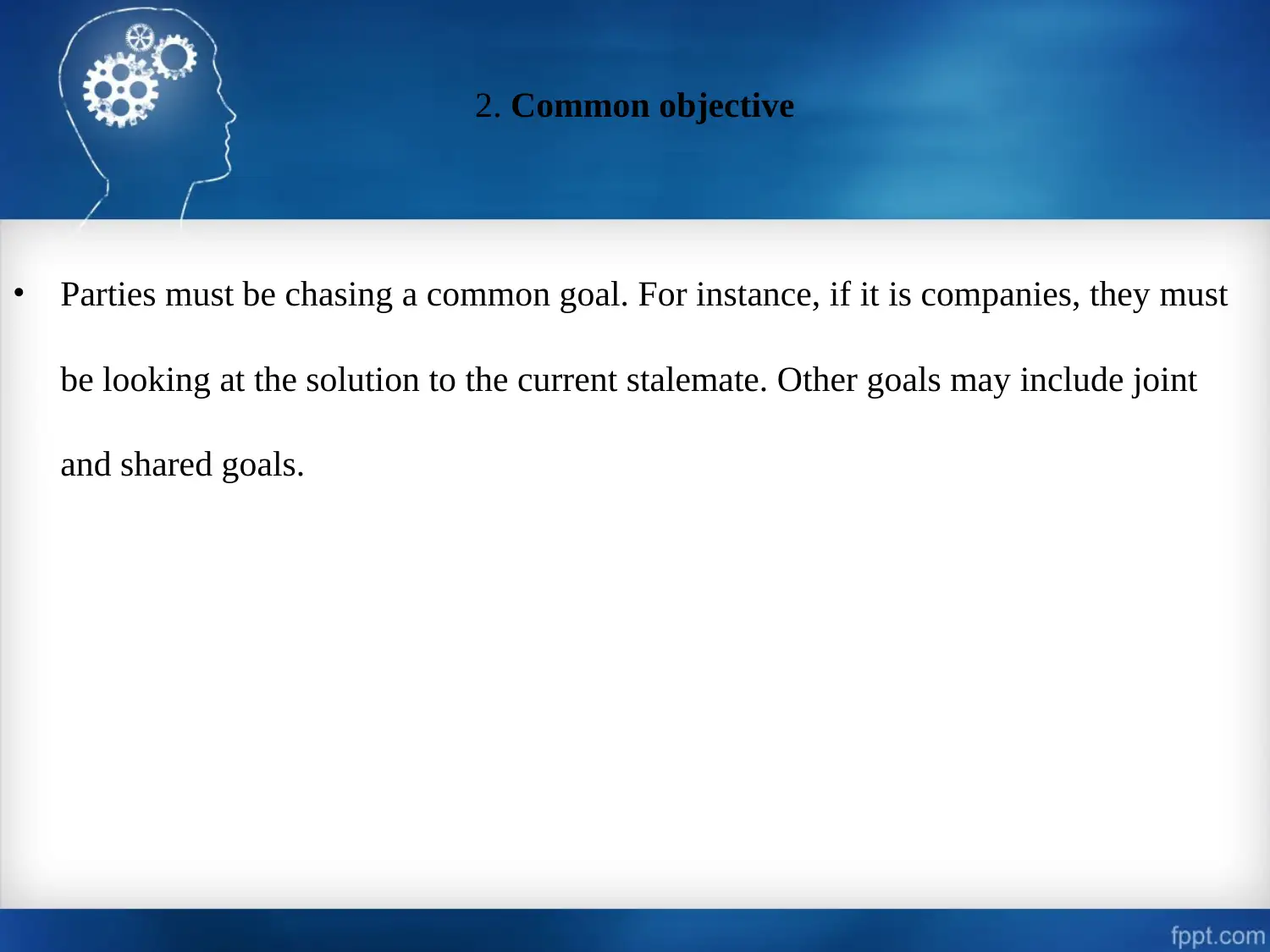
2. Common objective
• Parties must be chasing a common goal. For instance, if it is companies, they must
be looking at the solution to the current stalemate. Other goals may include joint
and shared goals.
• Parties must be chasing a common goal. For instance, if it is companies, they must
be looking at the solution to the current stalemate. Other goals may include joint
and shared goals.
Paraphrase This Document
Need a fresh take? Get an instant paraphrase of this document with our AI Paraphraser
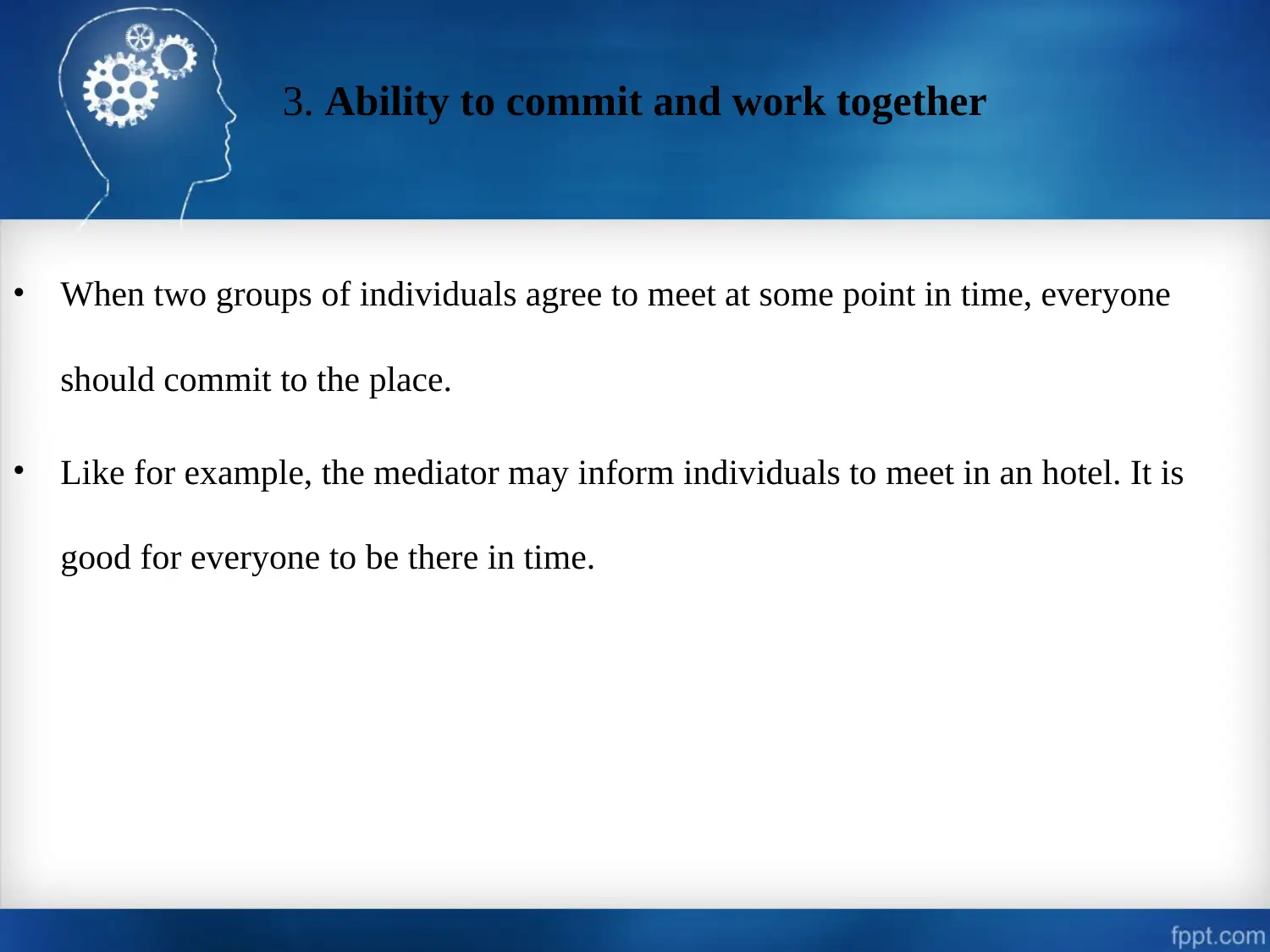
3. Ability to commit and work together
• When two groups of individuals agree to meet at some point in time, everyone
should commit to the place.
• Like for example, the mediator may inform individuals to meet in an hotel. It is
good for everyone to be there in time.
• When two groups of individuals agree to meet at some point in time, everyone
should commit to the place.
• Like for example, the mediator may inform individuals to meet in an hotel. It is
good for everyone to be there in time.
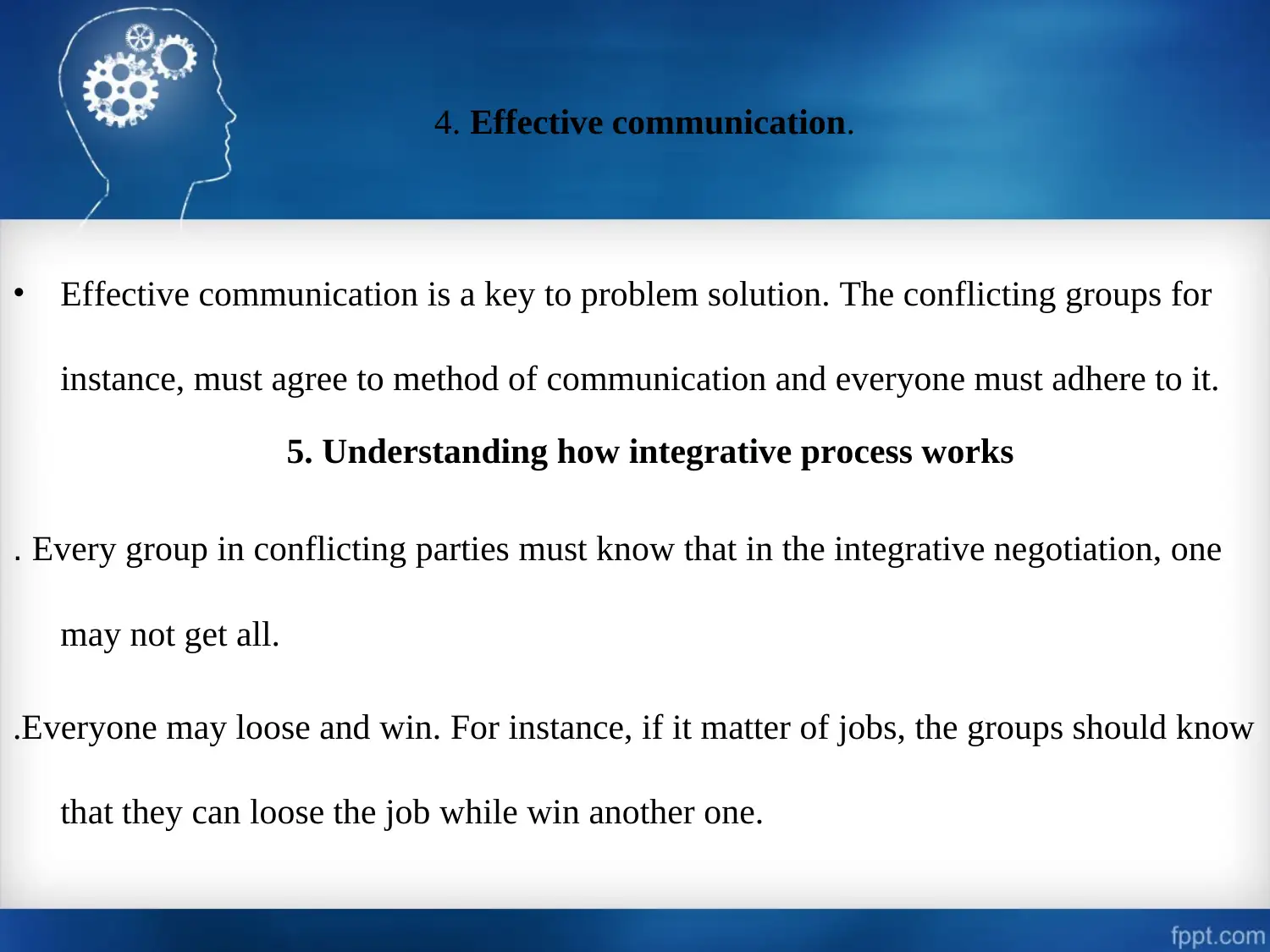
4. Effective communication.
• Effective communication is a key to problem solution. The conflicting groups for
instance, must agree to method of communication and everyone must adhere to it.
5. Understanding how integrative process works
. Every group in conflicting parties must know that in the integrative negotiation, one
may not get all.
.Everyone may loose and win. For instance, if it matter of jobs, the groups should know
that they can loose the job while win another one.
• Effective communication is a key to problem solution. The conflicting groups for
instance, must agree to method of communication and everyone must adhere to it.
5. Understanding how integrative process works
. Every group in conflicting parties must know that in the integrative negotiation, one
may not get all.
.Everyone may loose and win. For instance, if it matter of jobs, the groups should know
that they can loose the job while win another one.
⊘ This is a preview!⊘
Do you want full access?
Subscribe today to unlock all pages.

Trusted by 1+ million students worldwide
1 out of 19
Related Documents
Your All-in-One AI-Powered Toolkit for Academic Success.
+13062052269
info@desklib.com
Available 24*7 on WhatsApp / Email
![[object Object]](/_next/static/media/star-bottom.7253800d.svg)
Unlock your academic potential
Copyright © 2020–2026 A2Z Services. All Rights Reserved. Developed and managed by ZUCOL.





